May 14, 2025 | 19:50 GMT +7
May 14, 2025 | 19:50 GMT +7
Hotline: 0913.378.918
May 14, 2025 | 19:50 GMT +7
Hotline: 0913.378.918
Following the directives issued by the Prime Minister, Deputy Minister Nguyen Hoang Hiep led a delegation from the Ministry of Agriculture and Rural Development to inspect the countermeasures for saltwater intrusion during the dry season of 2023 - 2024 in Ben Tre and Tien Giang provinces on March 12.
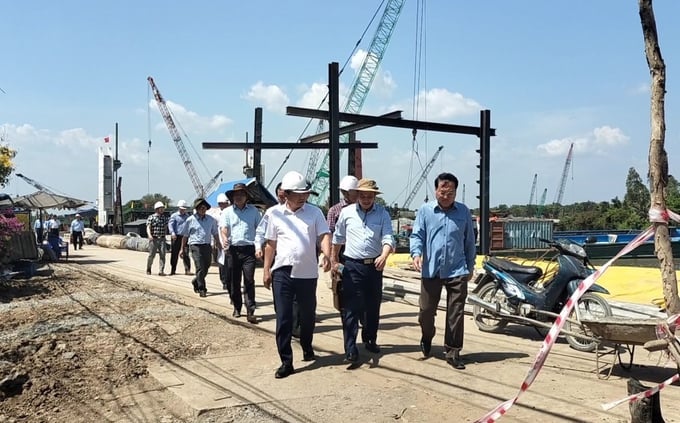
The delegation from the Ministry of Agriculture and Rural Development inspecting the progress of the Nguyen Tan Thanh sluice construction. Photo: Minh Dam.
Namely, Deputy Minister Nguyen Hoang Hiep inspected the Tan Phu saltwater intrusion barrier project at the upper reaches of the Ba Lai River located in Tan Phu commune, Chau Thanh district, Ben Tre province. This is one of the eight saltwater intrusion barrier projects under the Ben Tre water management project funded by the Japanese Government (JICA-3).
The project, which recently entered into operation at the same time as the Ben Ro barrier at the upper reaches of the Ba Lai River in Tien Long commune, helps prevent saltwater intrusion from the Tien and Ham Luong rivers into the Ba Lai River. Furthermore, the project provides freshwater for the local fruit tree production areas, such as durian and longan in the upper reaches of the Ba Lai River in Chau Thanh district.
The Deputy Minister also inspected the progress of the Nguyen Tan Thanh sluice construction project in in Tien Giang province. To date, more than 80% of the contract volume has been completed. The contractor has completed the sluice tower, sluice beam, sluice chamber 3, and installed the sluice gate system to begin preventing saltwater intrusion starting from March 1st, 2024. The remaining work is being accelerated to be completed by August 2024.
The two aforementioned projects make up a wide range of irrigation projects that the Ministry of Agriculture and Rural Development is investing in the Mekong Delta region. They aim to maximize the effectiveness of water regulation to protect production and stabilize the livelihoods of local residents.
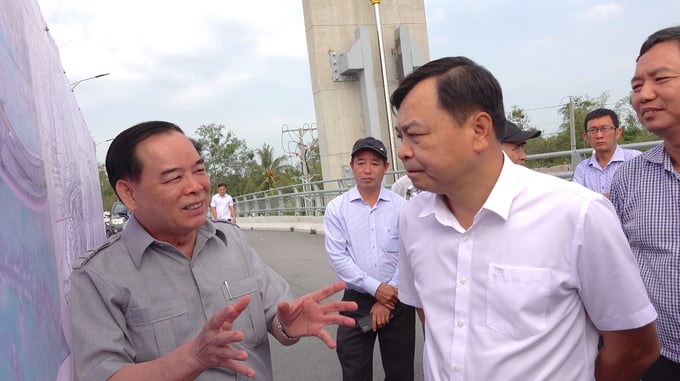
Mr. Tran Ngoc Tam, Chairman of the Ben Tre Provincial People's Committee and Deputy Minister Nguyen Hoang Hiep discussing the province's efforts in preventing saltwater intrusion. Photo: Minh Dam.
According to Deputy Minister Nguyen Hoang Hiep, specialized agencies under the Ministry has forecast saltwater intrusion in the Mekong Delta region to develop more aggressively in 2024. Saltwater intrusion has penetrated deeper compared to the general average of previous years, ranging from 5 to 15 kilometers. However, this level is at least 10 to 15 kilometers lower compared to that of the saltwater intrusion which occured during the dry season of 2019 - 2020.
Following inspections and discussions with the local governments, the Deputy Minister assessed that the provinces of the Mekong Delta region have extensive experience in managing saltwater intrusion. Namely, they issue directives in strict compliance with forecasts, and prepare response plans in advance to maintain proactiveness.
Moreover, provinces within the Mekong Delta region have planted 1.5 million hectares of winter-spring rice crop one month in advance. So far, over 600,000 hectares of rice have been harvested, and the remaining area has not been severely affected by saltwater intrusion. However, reports indicate that at least 20,000 hectares of rice production areas are affected, concentrated mainly in Tra Vinh and Soc Trang provinces. These provinces are located outside of the recommended zone, and local farmers failed to begin cultivation in advance.
Regarding specialized fruit tree production areas, proactive measures have been taken by the local governments and residents to ensure safety. Additionally, aquaculture and industrial production are proceeding without significant impact.
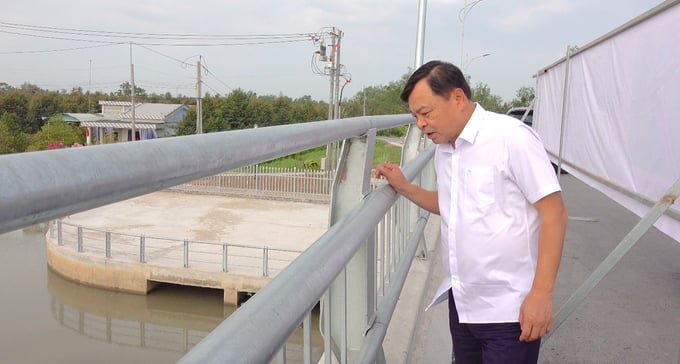
Deputy Minister Nguyen Hoang Hiep conducting inspection of the Tan Phu sluice project. Photo: Minh Dam.
However, the domestic water supply for residents in several areas at risk of being affected. Reportedly, nearly 30,000 households in the region are affected by water shortage, mainly due to centralized water treatment plants. Additionally, 10,000 scattered households are also affected by the shortage of domestic water.
According to the Deputy Minister, the region is facing the highest level of saltwater intrusion for the year. On the other hand, the Mekong Delta region is projected to face two episodes of saltwater intrusion, one at the end of March and another at the beginning of April. However, the projected impact is expected to be lower compared to that of the highest level between March 10 and March 13.
"So far, with regards to both infrastructure and non-infrastructure solutions in saltwater intrusion prevention, the Ministry of Agriculture and Rural Development, local ministries and agencies have been implementing the directives outlined in the government's resolutions as well as the directives from the Prime Minister," the Deputy Minister remarked.
In terms of non-infrastructure solutions, the Ministry has instructed farmers to advance the planting schedule by over a month in preparation for the winter-spring crop. In order to maintain an effective response to saltwater intrusion, local governments have conducted assessments to evaluate the state of water shortage for each household and every farm plot.

The Tan Phu sluice has been closed to prevent saltwater intrusion. Photo: Minh Dam.
Accordingly, the decentralized water storage solution has been highly praised by the Deputy Minister. The success of the current response to saltwater intrusion has been attributed to the decentralized water storage solution for both domestic and agricultural purposes.
Furthermore, the effectiveness of the current infrastructure initiatives has been thoroughly demonstrated. The Deputy Minister cited the example of the Cai Lon - Cai Be sluice project, and a series of saltwater-freshwater regulating sluices in the Mekong Delta region invested by the Ministry of Agriculture and Rural Development, which have exhibited high levels of efficacy.
"For example, the projects in Ben Tre province have supported saltwater intrusion prevention efforts, and ensured water supply for agricultural production on an area of over 30,000 hectares compared to the duirng the saltwater intrusion episode in 2019 and 2020. This is also a significant portion of the province's agricultural production area," emphasized Deputy Minister Nguyen Hoang Hiep.
One of the Mekong Delta provinces most impacted by saltwater intrusion, in addition to Ca Mau, is Ben Tre. Mr. Bui Van Tham, Deputy Director of Ben Tre province's Department of Agriculture and Rural Development, reported that between March 8 and March 11, approximately 52 to 64 kilometers of the province's main river mouths are affected by a salinity level of 4‰; approximately 70 to 79 kilometers of the province's main river mouths are affected by a salinity level of 1‰. Consequently, this episode of saltwater intrusion occurred earlier, caused more extensive damage, and lasted longer compared to the average level of the previous years. Additionally, this level of saltwater intrusion is comparable to the dry season of 2015-2016.
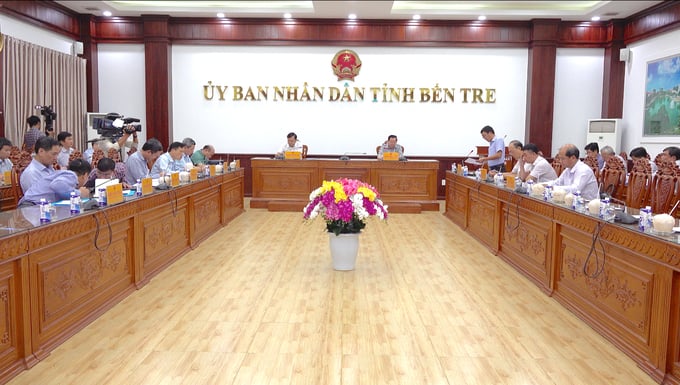
The delegation from the Ministry of Agriculture and Rural Development in a meeting with Ben Tre province. Photo: Minh Dam.
According to Mr. Bui Van Tham, proactive measures have been taken in respones to saltwater intrusion, with detailed plans implemented by various sectors and levels within Ben Tre province. Most notably, the province has focused on dissemination efforts, mobilized the local community and businesses to actively store rainwater and freshwater by utilizing reservoirs, garden canals, and localized dam constructions in key areas.
Moreover, with investments from the central government, Ben Tre province has seen the completion and effective utilization of multiple irrigation projects. Regarding agricultural production, Ben Tre province has successfully protected over 7,700 hectares of winter-spring rice fields with a yield of 6 tons per hectare. In addition, more than 79,000 hectares of coconut trees and nearly 24,000 hectares of other fruit trees exhibited healthy growth without damage from saltwater intrusion.
However, Ben Tre province is currently suffering from a shortage of domestic water supply during the dry season due to the salinity contamination of raw water sources in various water treatment plants. To date, Ben Tre province houses 67 clean water supply plants with a total capacity of approximately 250,000 cubic meters per day. These plants primarily rely on the local surface water sources for treatment. Measurement data indicates that the salinity levels in the treated water falls between 0.1 and 2.4‰ in Ba Tri district, between 0.2 and 4.0‰ in Mo Cay Nam district, and between 0.1 and 1.3‰ in Chau Thanh district.
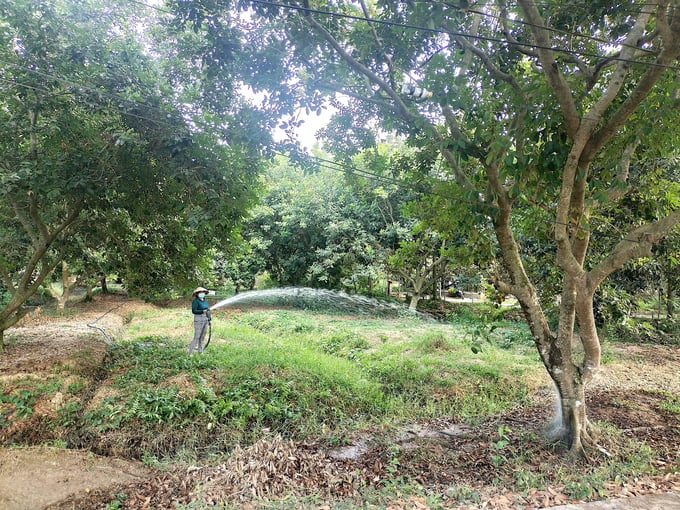
Agricultural production in Ben Tre province is being protected with the help of proactive measures. Photo: Minh Dam.
Mr. Tran Ngoc Tam, Chairman of the Ben Tre Provincial People's Committee, further stressed that the current irrigation system in both northern and southern Ben Tre is underdeveloped, and the Water Management Project (JICA3) is still in the implementation phase. As a result, the province cannot fully proactively control freshwater sources in the event of aggressive saltwater intrusion.
Regarding the province's long-term plan, Mr. Tran Ngoc Tam proposed the Ministry of Agriculture and Rural Development to promptly implement the remaining sluices under the Ben Tre Water Management Project (JICA-3), including the An Hoa sluice, Ben Tre sluice, Thu Cuu sluice, Cai Quao sluice, and the remaining sluices in both northern and southern Ben Tre.
On the other hand, he also suggested the Ministry of Agriculture and Rural Development to study the construction of a saltwater intrusion barrier at the mouth of the Ham Luong River in combination with a Ham Luong Bridge on the coastal road to prevent saltwater intrusion into this river mouth and the inland areas.
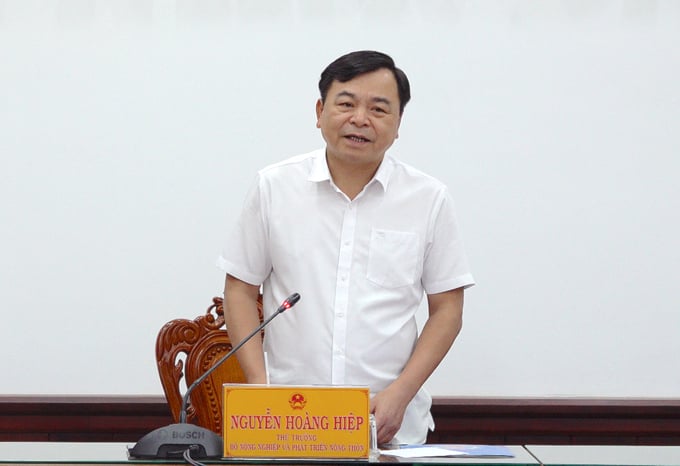
Deputy Minister Nguyen Hoang Hiep announced that the JICA 3 project is expected to be essentially completed by 2026. Photo by Minh Dam.
During the meeting with delegates from Ben Tre province, Deputy Minister Nguyen Hoang Hiep acknowledged the challenges the province currently facing, with an emphasis on the scarcity of freshwater for both daily activities and production. He affirmed that the local non-infrastructure solutions are relatively effective.
Regarding local ongoing projects, the Deputy Minister stated that the Ministry of Agriculture and Rural Development will expedite the progress of its climate change adaptation projects. Additionally, the Ministry will explore the option of a pre-feasibility study for a saltwater intrusion barrier project at the Ham Luong River.
"We are currently working on several projects with Ben Tre province. The JICA-3 project has been delayed by two years compared to the initial plan. We commit to completing JICA-3 with Ben Tre by 2026, thereby ensuring stability for the entire northern region of Ben Tre.
Regarding the southern region of province, we will utilize mid-term public investment funds and seek the approval of the Government and the Prime Minister to invest an additional 2,000 billion Vietnamese dong. It is projected that by 2027, Ben Tre province will have secured stable water sources for production and daily activities," Deputy Minister Nguyen Hoang Hiep added.
In addition to both infrastructure and non-infrastructure solutions, Deputy Minister Nguyen Hoang Hiep requested Mekong Delta provinces to strictly comply with the government's directive principles: "No households should be deprived of domestic water, no lack of water for industrial production, and no adverse impacts on key fruit production areas or aquaculture areas. In-progress projects must be expedited."
Translated by Nguyen Hai Long

(VAN) Data from 10,000 farming households will help professionalize production organization and support the implementation of the One Million Hectares Program for High-Quality, Low-Emission Rice Cultivation.

(VAN) FAO Director-General QU Dongyu marks International Day of Plant Health at NENA conference.

(VAN) Deputy Minister of Agriculture and Environment Hoang Trung affirmed that floriculture and ornamental plants are a growing industry that receives significant global attention.

(VAN) The three staple crops dominating modern diets – corn, rice and wheat – are familiar to Americans. However, fourth place is held by a dark horse: cassava.
/2025/05/10/4037-3-223011_495.jpg)
(VAN) Remote sensing technology is becoming an indispensable tool in monitoring resources, developing modern agriculture, and protecting the environment in Vietnam.
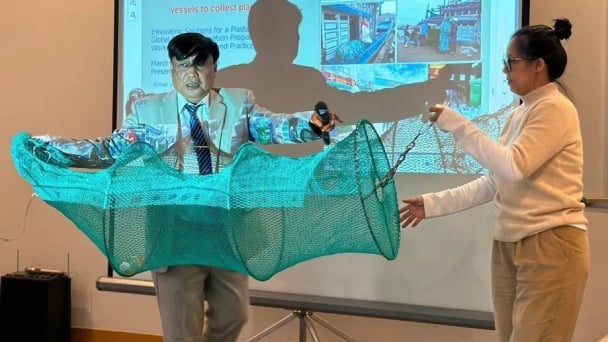
(VAN) The trash bag used on fishing vessels can withstand rough sea conditions, including level 8 to level 10 winds and waves. Notably, it can be hung anywhere on the boat.
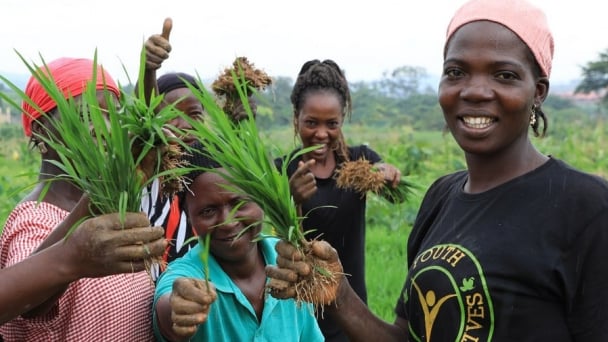
(VAN) African leaders launched the Kampala Declaration on Building Resilient and Sustainable Agrifood Systems in Africa, marking a bold step toward transforming the continent's agriculture.